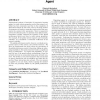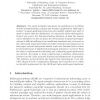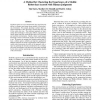1047 search results - page 74 / 210 » Learning the required number of agents for complex tasks |
ATAL
2010
Springer
13 years 9 months ago
2010
Springer
Experimental analysis of networks of cooperative learning agents (to verify certain properties such as the system's stability) has been commonly used due to the complexity of...
AAAI
2011
12 years 7 months ago
2011
Coarse-to-fine approaches use sequences of increasingly fine approximations to control the complexity of inference and learning. These techniques are often used in NLP and visio...
ATAL
2007
Springer
13 years 11 months ago
2007
Springer
This paper addresses distributed task allocation in complex scenarios modeled using the distributed constraint optimization problem (DCOP) formalism. We propose and evaluate a nov...
ESAW
2004
Springer
14 years 1 months ago
2004
Springer
The agent metaphor has shown its usefulness for modelling as well as implementing complex and dynamic applications. Although a number of agent applications has been successfully re...
AAAI
2000
13 years 9 months ago
2000
If robotic agents are to act autonomously they must have the ability to construct and reason about models of their physical environment. For example, planning to achieve goals req...



